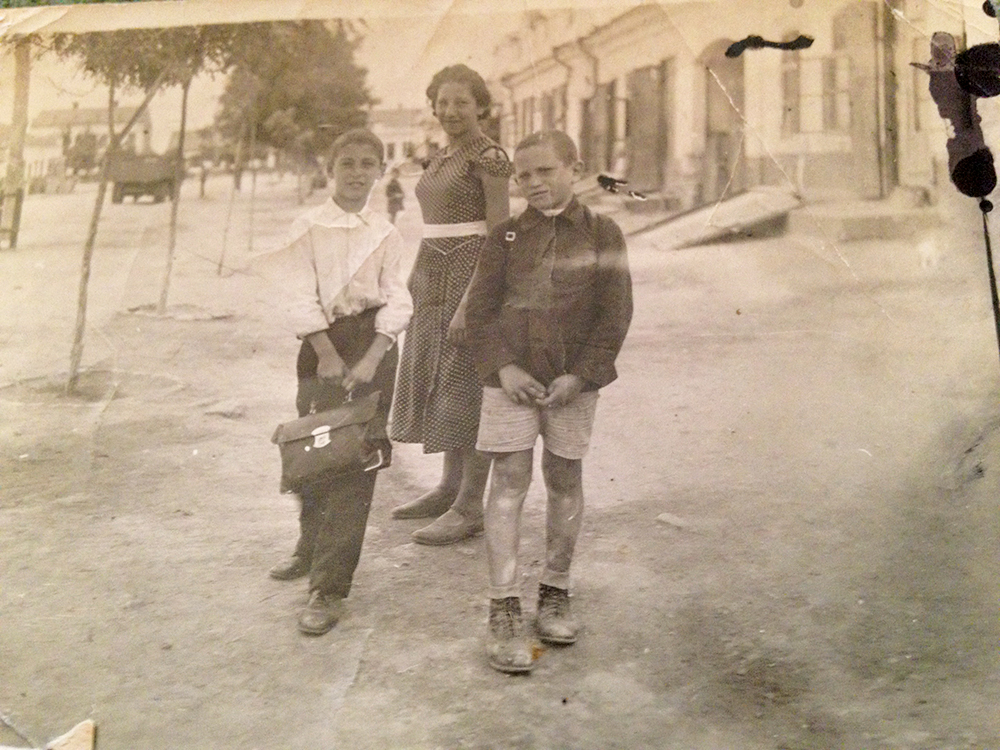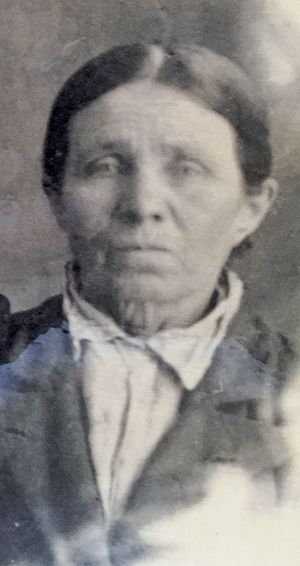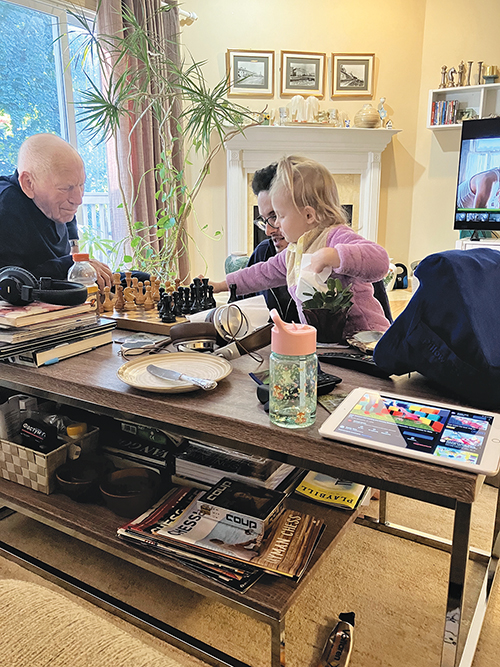
Boris Tulman, now approaching his 97th birthday, resides in Teaneck. His daughter Diana Tulman is the owner of the International Chess Academy located across from Votee Park. For almost 30 years Tulman has been actively involved in packing for the local Tomchei Shabbos. In the words of Ari Wartelsky who oversees the organization, “We love Boris Tulman. He is incredible. He is at the warehouse every Wednesday morning to open up for early deliveries. He makes boxes better than the teenage boys!”
Tulman’s grandson Slava Koza resides with his wife and daughter Beatrice, Tulman’s great-granddaughter, in Fort Lee. He has been a chess coach at several of the Jewish schools in the community. Koza contacted The Jewish Link on behalf of his grandfather who expressed his desire to share his story of survival during the Nazi invasion of Russia during the Holocaust. Tulman felt that in light of the horrific October 7 attack on the Israeli communities on the Gaza border and continuing warfare on both the southern and northern fronts, his story of survival could be a ray of hope during these ominous times.

Tulman was born in 1927 in Moldavia (present-day Moldova), then part of the Soviet Union. His mother, Zlota, passed away from a long illness in 1939, leaving his father, Shimon, to raise him and an older brother and sister. In 1941, as the Nazis were advancing into Moldavia, his father and older brother were separated from Boris and his sister Roza, as they were forced to evacuate to Kazakhstan, deeper into Russia. Unfortunately, his father fell ill and died during the evacuation. Alone now, young Boris and his sister were transported deeper into Russia and ended up in the Northern Caucasus region. Roza opted to work in a hospital where she could find refuge, essentially leaving the 13-year-old Boris all alone in the world. Tulman feels that he “truly became a man” then, as he had only himself to rely upon for survival.
As evacuees were placed in the homes of locals in the area, Tulman was sent to the home of Maria Petrovna Svyatoshova, a Christian woman and wife of a local Cossack. As the mother of four sons who were conscripted into the Red Army, and a fifth who was still quite young, Maria was happy to have Tulman live with her and help maintain her land. The boy learned many skills from his life on the farm, skills which helped him greatly in later years.
Tulman developed a close bond with Maria, who became his surrogate mother during those years. On several occasions she even protected him from the encroaching Nazis at great risk to herself and her family. When she could no longer protect him in her house, she sent him to her own brother Vasily’s home some 20 kilometers away where nobody knew he was Jewish. Fortunately for Tulman, his blonde hair and blue eyes often protected him from being discovered.
When Vasily’s family felt they were being endangered by Tulman’s presence, they sent him to live with yet another family. Nikolai Menshikov was a kulak (prosperous or wealthy peasant farmer) whose house had been returned to him by the Nazis in a gesture of appeasement. While at Menshikov’s home, Tulman was alarmed at the sight of the Nazi gassing vans which were roaming the area and rounding up Jews to their deaths. Tulman also came to recognize the Nazi collaborators among the locals and learned to avoid them.
On the last night of the war, as the Nazis were beginning to retreat, Tulman remained in the Menshikov home alone and was almost identified as a Jew by the fleeing Germans when he visibly understood the German word for “hot water” as it resembled the Yiddish word for the same.

After the surrender of the Nazis, Tulman returned to Maria’s home 20 kilometers away. When he was stopped by a local guard and he declared that he was Jewish, the guards did not believe him as they were convinced that all local Jews had been killed.
Although sad to part with him, Maria convinced the now-15-year old Tulman to reunite with his sister and brother who were in Uzbekistan by that point. When he unexpectedly showed up at the Uzbek machine tractor station where some of his family now worked, his aunt fainted in disbelief at seeing her nephew once more. Everyone assumed he had been killed.
Shortly after his reunification with family, Tulman was drafted into the Red Army but fortunately was never sent to the front during his seven years of service. After returning, the extended family moved back to the capital city of Kishinev in Moldavia, where Tulman worked as a sewing machine mechanic. In 1952 he married; he and his wife eventually had two daughters. Life in Kishinev was devoid of almost all Jewish culture and so the family opted to emigrate to the U.S. in 1991.
Initially living in Brooklyn, the family moved to New Jersey for a quieter and safer life. Tulman became involved in a local synagogue which brought together families that had also emigrated from the Soviet Union and had much in common. Tulman volunteered for Tomchei Shabbos as he felt that its mission of providing Shabbos and holiday food for those who needed that extra help was important as it was a way of paying back all the goodness that he had been blessed with during his difficult youth.
We wish Boris Tulman good health and much happiness going forward and thank him for sharing his story with Teaneck and neighboring communities.












